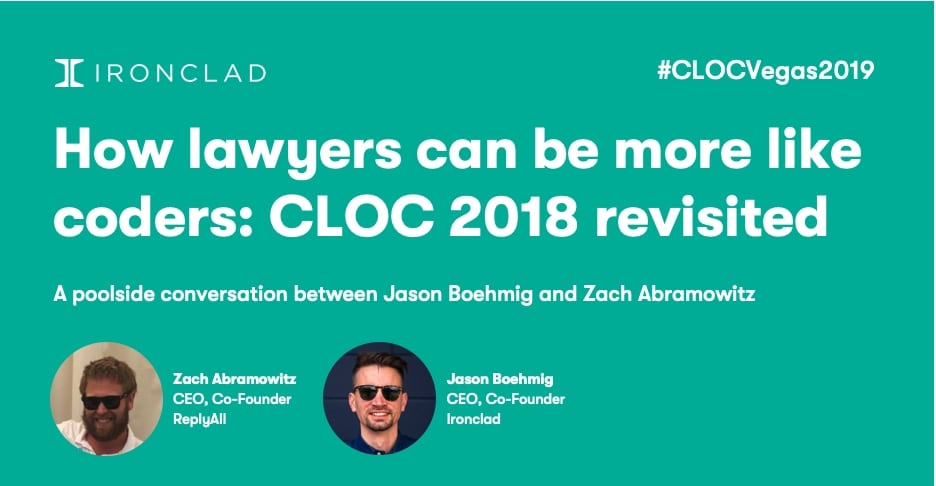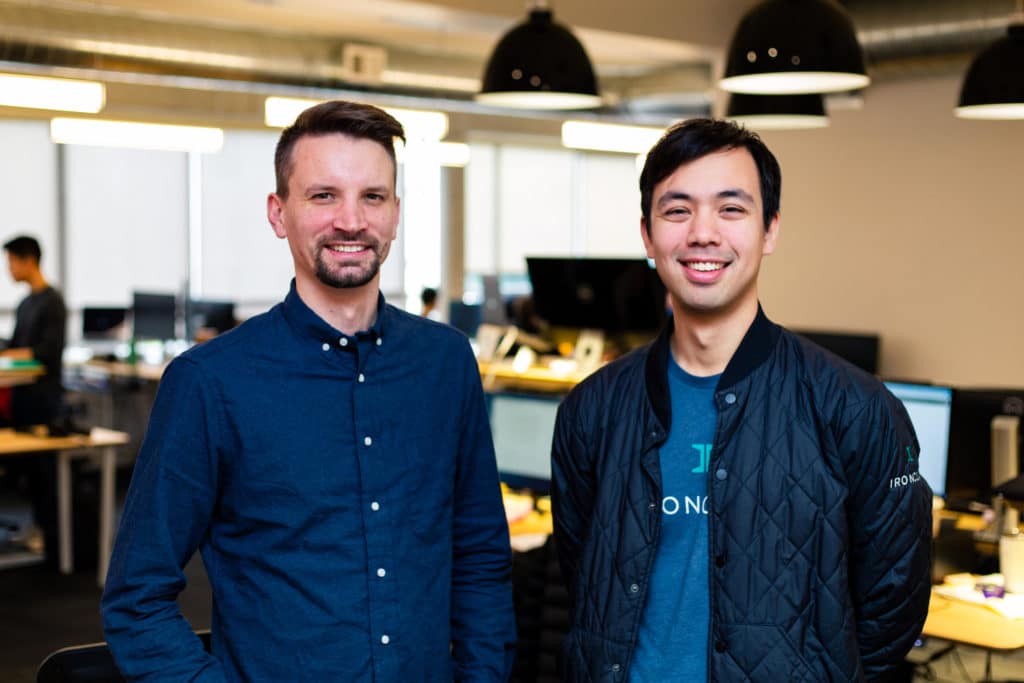Six years ago, when I was a Corporate Attorney at Fenwick & West, I began taking coding classes on the weekends. I had a hunch that technology could speed up many of the routine tasks that came across my desk, and I wanted to know if I was right.
What I didn’t realize at the time was that those classes would transform my view of the legal industry, show me how data and technology can help lawyers work smarter, and pave the way for Ironclad, the digital contracting platform that Cai GoGwilt and I co-founded in 2014.
With CLOC Vegas 2019 just around the corner, our team has been busy preparing a can’t-miss lineup of community events and presentations. At the same time, we’ve been reflecting on how to maintain our core values as our company and product continue to grow.
We’re not just building software; we’re building the company that we want to work at. That means balancing innovation with intentionality, work with life, and planning with reflection.
A lot has changed at Ironclad in the past year. Our headcount tripled, our team moved into a new office, and we finalized our Series B funding, led by Sequoia Capital.
I’m humbled and excited by those developments, but I’m just as grateful for all that’s stayed the same since Day 1. Our company is still on a mission to power the world’s contracts, and we’re still focusing all our attention on building products that legal teams love.
In the spirit of reflection, I wanted to post a poolside podcast (ask me for the backstory) I recorded with Zach Abramowitz, co-founder and CEO of ReplyAll, at CLOC 2018. We talk about Ironclad’s journey since founding, why legal tech has shown more promise in the past five years than in the previous twenty, and why improving contracts improves every part of our economy.
Here are the topics that stood out, listening to our conversation a year later:
- Law is often like software engineering. In both jobs, the main challenge is identifying and fixing small issues within complex, interdependent systems. The difference is that lawyers are often tasked with manually reviewing documents that may reach hundreds of pages in length, while coders can typically run tests that automatically identify any faulty dependencies or issues in their software. (Cai GoGwilt, our co-founder and CTO, attributes law’s labor-intensive bent to lawyers having a higher pain threshold.) Law is evolving to become more like software engineering—and that’s good news for lawyers. [9:54]
- Past experience doesn’t just inform your pitch; it also shapes the product you create. Without the experience of working in a law firm, it would have been much harder to deliver a product that legal teams actually used in critical contract situations, especially in cases where they might otherwise have defaulted to using a word processor. Being able to empathize with our users was a big part of why co-founder Cai and I were able to combine our expertise in law and technology to make a successful debut at Y Combinator. [23:40]
- Legal tech is in a moment of unprecedented opportunity. It’s not just that startups and VCs are interested in taking on heavily regulated industries; it’s also that the cost of creating and hosting software has fallen dramatically. That’s created a situation where selling and implementing a legal tech product can happen far more quickly than it could in the past. That’s only half the story, though. [31:00]
- Saying no to potential customers hasn’t hurt our company, it’s only paved the way for partnerships down the road. Ironclad has been intentional about choosing customers that are likely to be effective partners over the long run. Sometimes, that means turning down customers or explaining why our product doesn’t provide a particular feature. Customers have found that honesty refreshing, and they’ve told us so. [32:50]
- Contracts are the grease on the wheels of the economy. No one benefits from inefficient contract processes. By putting guardrails around contracting, both contract requesters and reviewers (think Sales and Legal) are able to do their jobs more effectively. [43:00]
If you’re interested in learning more, the whole episode can be found below:
Quick links:
- 3:30 — On whether serial entrepreneurship is part of Ironclad’s DNA
- 9:04 — How being a lawyer is like being a coder
- 11:10 — Why contracts are a data problem, and what Ironclad’s thesis is
- 16:04 — What our company learned from our experience at YCombinator
- 21:27 — What a programmatic contract is, and why it will change the way legal teams work
- 26:30 — Why choosing the right co-founder can make or break your business
- 31:00 — Why there’s never been a better time to be in legal tech
- 32:50 — How turning down business helped Ironclad grow
- 39:02 — Why Ironclad has been as useful for large (pre-IPO) companies as it has for small startups
- 43:00 — How contracts are the grease on the wheels of the economy
- 45:00 — On the limits of automation, or why we need both lawyers and humans to move the legal profession forward

Ironclad is not a law firm, and this post does not constitute or contain legal advice. To evaluate the accuracy, sufficiency, or reliability of the ideas and guidance reflected here, or the applicability of these materials to your business, you should consult with a licensed attorney. Use of and access to any of the resources contained within Ironclad’s site do not create an attorney-client relationship between the user and Ironclad.


